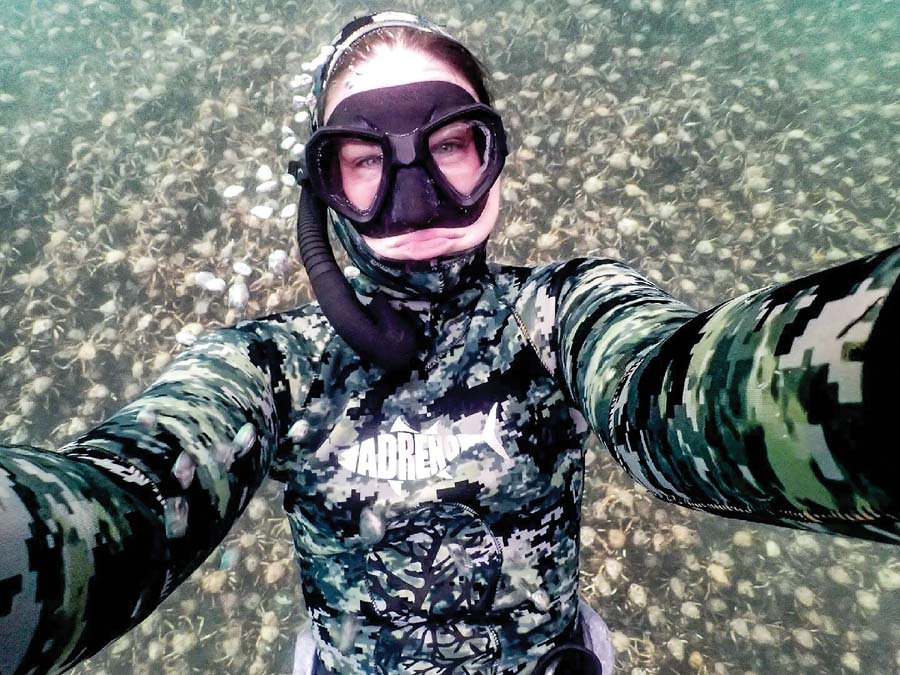THE stakes in the war-of-words over the catching of giant spider crabs at Rye and Blairgowrie took a strong political turn last week.
In a full page advertisement in The News the Victorian Recreational Fishing peak body VRFish slammed those opposed to catching the crabs during their annual moult as an “attack by a loose association of conservation, NIMBY, and self-interested water user groups in a campaign coordinated by an avowed anti-recreational fishing group”.
It even posed the inflammatory headline: “Is a ban on snapper fishing next?”
VRFish took aim at Mornington Peninsula Shire, which wrote to Fishing and Boating Minister Melissa Horne in June seeking a ban on catching the crabs during their annual May-July moult off Rye and Blairgowrie. Deputy mayor Cr Sarah Race said at the time: “This is a phenomenon that should be celebrated, not decimated.” (“Spider crabs stay on the menu” The News 31/5/21).
Copies of the council’s request were forwarded to Energy, Environment and Climate Change Minister Lily D’Ambrosio, and to peninsula MPs.
The council pleaded for a reduced bag limit, education campaigns with interpretive signage “aimed at all coastal users” and tabled plans for a winter ‘closed season’ to secure the sustainability of the event. In October last year the Victorian Fisheries Authority reduced catch limits from 30 to 15 crabs.
The mayor Cr Despi O’Connor said the community had “deep concerns about the increased level of human interference with the annual spider crab moulting event”.
“This amazing, world-renowned spectacle is only able to be witnessed from shore at Rye and Blairgowrie and we’ve asked for a ‘no-take’ season for spider crabs to protect this unique phenomenon,” she said.
“This is entirely consistent with the Victorian Marine and Coastal Act 2018 and the Marine and Coastal Policy 2020, which prioritise protecting the marine environment from threats of any sort. The community has told us they love witnessing this amazing spectacle, but if the level of human interference we’ve seen in recent years continues, the future of this species and ecosystem is at risk.
“This is not about being anti-fishing. It’s about sustainability and the right of the majority of locals and visitors to simply witness and enjoy this amazing annual event.”
But VRFish was unmoved: “That Mornington Peninsula Shire Council is opposing a form of recreational fishing is not surprising as we consider this council the worst supporter of resident and tourist recreational fishers and boaters of any local government in the state,” the statement said.
It added that the “localised, short-lived, annual fishery is a legal and beneficial outdoor activity” done by a “small, but important, recreational fisher community”.
Also, that the crabbing “does not pose a sustainability or biomass threat and we support the scientific studies and surveys currently underway”.
VRFish said the “clearly xenophobic and ignorant minority against the crab fishery [who assert] that it holds no ‘cultural significance’ for participants, should serve to discredit these groups. Recreational fishers are clearly practising ‘crab culture’ common in Chinese cuisine for 300 years.”
It said examples of “deeper connection, or cultural heritage” in sustainable fishing among immigrant families included blue sea mussell gathering by Italians at Brighton Beach; calamari fishing from bay piers by Greeks, and skipjack tailor fishing by Vietnamese at Newport power station. But those opposed say the 300-year-old Chinese crab culture was not carried out in Australia, and that mussels, skipjack and squid are not necessarily taken when the animals are at their most vulnerable.
VRFish said: “Despite deliberately misleading assertions by the group opposed, the Giant Spider Crab Recreational Fisher Survey shows recreational fishers value the spider crab catch, consume the crab and comply with current fisheries regulations.”
VRFish said there was little safety risk posed by sharks attracted by the crab fishers but decried the “wanton vandalism” on crabbers’ equipment and “threats of violence” at Rye and Blairgowrie piers.
The body said it would ask the state government to “increase protection” for crabbers “using exclusion powers under the Marine Safety Act 2010”.
Rye Community Group Alliance’s president Mechelle Cheers said reading the “innuendos, self-justification and other nonsense” expressed in the VRFish statement made her “wonder about the ethics of this non-Mornington Peninsula-based fishing lobby group”.
“The inflammatory headline trying to incite traditional fishers says it all. A quick ask around confirmed there is no “avowed anti-recreational fishing group” on the southern end of the peninsula,” Ms Cheers said.
First published in the Southern Peninsula News – 29 June 2021


